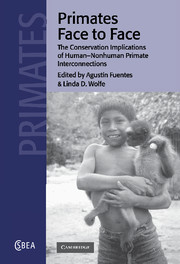Part 3 - Conservation of nonhuman primates
Published online by Cambridge University Press: 20 October 2009
Summary
A common theme that arises from every section of this book is that of complexity and the inextricable interconnections between ecology and human cultures. While the title of this compilation involves the word ‘conservation’ and all of the chapters touch on the subject, the chapters in this section focus on the nexus of culture and ecology in the light of conservation issues. There is no longer the possibility of studying a group, or population, of nonhuman primates without coming into contact with human interaction, manipulation, and/or habitat destruction. Ninety per cent of the world's primates are found in tropical forests and it is precisely these forests that are being converted to human use faster and more dramatically than any other habitats on earth. Fifty per cent of all primate species are a conservation concern to the Species Survival Commission (SSC) and the World Conservation Union (IUCN), and 20% are considered endangered or critically endangered. Today these numbers continue to rise in the face of continuing threats.
Unfortunately, the tropical areas that are home to most nonhuman primates are some of the most economically precarious and therefore politically unstable nations on earth. Human greed, lack of long-term foresight, global economies and colonial legacies contribute to dramatic food shortages among already impoverished people.
- Type
- Chapter
- Information
- Primates Face to FaceThe Conservation Implications of Human-nonhuman Primate Interconnections, pp. 183 - 186Publisher: Cambridge University PressPrint publication year: 2002



